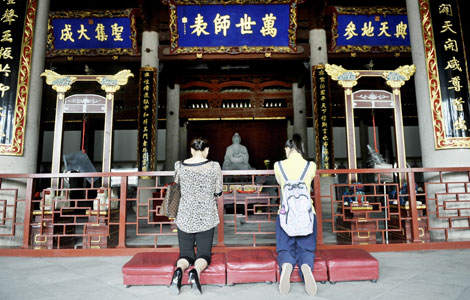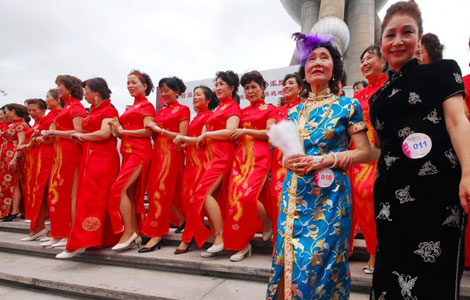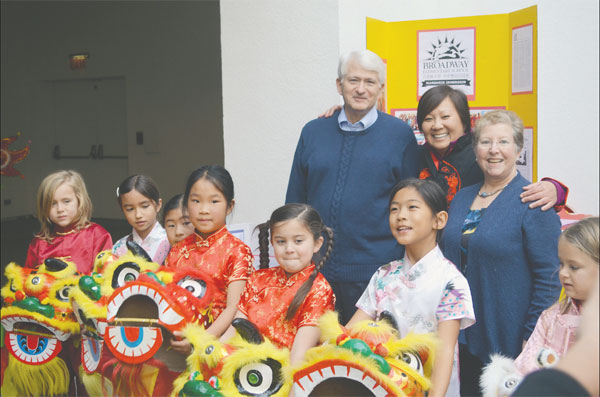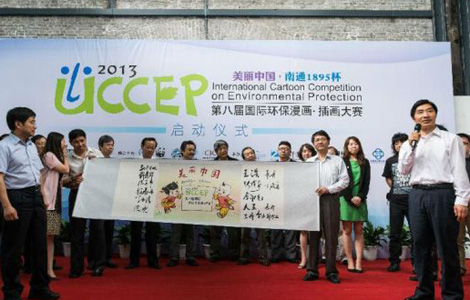'Bottom-up' education enhances ties
Updated: 2013-06-07 13:09
By Wang Jun in Los Angeles (China Daily)
|
||||||||
|
Students learning Mandarin in Broadway Elementary School in Venice, California. Provided To China Daily |
As head of the Confucius Institute at UCLA, Susan Pertel Jain has reasons to be enthusiastic: a new play involving young people from Los Angeles and Hangzhou, and Chinese President Xi Jinping's visit this week to Southern California.
"I hope his wife, who's an artist, will come and see the play - the kids would be so excited," Jain said, referring to Peng Liyuan, who was famous as a folk singer in China even before she became first lady.
The cross-cultural co-production Pacific Cinderella is based on a 9th-century Chinese tale known as The Butterfly Fairy that drew the interest of Stephanie Vlahos, a teacher at the Los Angeles County High School for the Arts.
"It's the Chinese version of Cinderella," Jain said.
The high school has a Confucius Classroom affiliated with the UCLA Confucius Institute, where Jain is executive director. The Los Angeles students and their peers at the Hangzhou School of Performing Arts have come together for a show that combines traditional Chinese art forms with American styles such as hip-hop.
Jain believes organic, bottom-up collaborations such as this have a lasting impact on cultural understanding.
Although the first lady's attendance is unlikely, the local high school students are full of enthusiasm about China and Chinese culture. Recalling the visit Xi, then China's vice-president, made to Los Angeles last year, she said: "It's so powerful."
Soon after, Hanban, the organization affiliated with China's Education Ministry that oversees Confucius Institute worldwide, invited the young Angelenos to visit Beijing.
"Not all of the kids are from wealthy families," Jain said. In the Chinese capital, the students toured the foreign ministry and met with the then deputy foreign minister Cui Tiankai, who has since become China's ambassador to the United States.
After that visit, which included questions from the students, "some kids thought for the first time that they want to be a diplomat when they grow up", Jain said.
Other partnerships to promote cross-cultural understanding include two-year scholarships, funded by auto-parts maker Wanxiang Group, for 22 students in Chicago to learn Mandarin and study China's energy-efficiency efforts. Students in Iowa will soon have access to the scholarship program, according to Jain.
Steve Schwarzman, founder of private-equity firm Blackstone Group LP, is establishing a $300 million scholarship program to enable 200 students, mostly from the US, to study in China.
"We want all kids to apply, not only those from elite schools," Jain said.
Confucius Institutes, which are funded and supervised by Hanban, are typically affiliated with colleges or universities in the host country. The individual nature of its on-campus partnership gives each institute unique strengths, Jain said.
At UCLA, for example, the Confucius Institute is focused on the arts because its executive director has a PhD in the study of Chinese Chuan opera and connections in China's artistic community. She is also fluent in Mandarin.
At the University of California, Davis, the Confucius Institute concentrates on food research because its campus is in the heart of a farming community. Celebrity chef Martin Yan is a graduate of UC Davis.
Distance learning is the priority for the Confucius Institute at the University of Kansas, with institute-affiliated classrooms linked by digital technology.
"Support from the bottom up is what makes our programs sustainable," Jain said.
wangjun@chinadailyusa.com
(China Daily 06/07/2013 page13)

 Obama to meet Xi at Sunnylands Center
Obama to meet Xi at Sunnylands Center
 'Dinner in the Sky' in Brussels
'Dinner in the Sky' in Brussels
 Businesses benefit from 'gaokao economy'
Businesses benefit from 'gaokao economy'
 All dressed up
All dressed up
 Russian President Putin, wife announce divorce
Russian President Putin, wife announce divorce
 Beijing bike-sharing program needs more riders
Beijing bike-sharing program needs more riders
 6 dead in Philadelphia building collapse
6 dead in Philadelphia building collapse
 China's middle class emerges, to spend more
China's middle class emerges, to spend more
Most Viewed
Editor's Picks

|

|

|

|

|

|
Today's Top News
DPRK proposes meeting with ROK on Sunday
China to protect investors' interests: President Xi
Xi arrives in California for summit with Obama
US teacher held for sex abuse in Shanghai
China's GDP might be No 1 in 2030
Xi: Strengthen trade links with Mexico
Reel potential for Chinese films abroad
Dragon Mart to land in Cancun
US Weekly

|

|








